Is your garage floor an eyesore with cracks and stains, leaving you wondering if there’s a real fix that lasts? If your concrete garage floor is showing its age, you’re not alone—and you’re in the right place. This comprehensive guide breaks down exactly how garage floor resurfacing can restore your space with professional results, helping you move from frustration to a flawless finish.
Are You Struggling with Garage Floor Resurfacing?
If you’ve noticed cracks, pitting, or oil stains on your garage floor, you’re probably grappling with whether garage floor resurfacing is the right solution. Many homeowners hesitate, fearing the cost or complexity of fixing their concrete garage floors. The good news? Most modern resurfacing options make it possible for anyone to achieve a smooth, durable surface, whether you’re seeking a quick fix or a lasting upgrade. In fact, resurfacing your garage floor adds not just curb appeal, but also a protective barrier against heavy vehicles, weather, and chemicals.
Tackling garage floor resurfacing doesn’t have to be intimidating. Today’s concrete resurfacing solutions and floor coatings offer a wide range of options for every budget and skill level. Whether you opt for a basic concrete overlay or advanced epoxy floor coatings, the investment extends the life of your garage floor significantly. Read on to discover step-by-step guidance, cost breakdowns by the square foot, and expert recommendations to help you effortlessly transform your garage space.

Why Garage Floor Resurfacing Matters
Resurfacing your garage floor is more than just a cosmetic update; it serves as a crucial layer of protection against everyday wear-and-tear. Unaddressed cracks and stains can develop into deeper structural issues, leading to costly repairs. A fresh coat or overlay not only improves your concrete garage floor’s appearance but also adds value to your home and provides a safer, slip-resistant surface for families and vehicles alike.
A professionally resurfaced floor can withstand everything from heavy tool drops to chemical spills. With concrete resurfacing, you ensure long-term strength, easier maintenance, and improved durability. Many homeowners find that taking this step helps prevent larger issues by sealing out water and stains, making it an excellent idea for anyone planning to stay in their current home—or preparing for resale. Simply put, garage floor resurfacing is an investment in your property’s longevity.
Common Challenges with Garage Floor Resurfacing
Despite the benefits, resurfacing a concrete garage floor poses unique challenges. Many people underestimate the importance of concrete surface preparation, which can lead to premature failure of the new coating or overlay. Choosing the wrong resurfacing material or applying it under poor conditions—such as too much moisture or suboptimal temperatures—can also cause peeling, bubbling, or uneven results.
Another common pitfall is ignoring existing damage beneath the surface. Skipping necessary concrete repair steps or failing to properly clean and abrade the garage floor will prevent coatings from bonding as they should. Fortunately, understanding these potential obstacles and following best practices can lead to a successful, long-lasting transformation of your garage space.
What You’ll Learn in This Guide on Garage Floor Resurfacing
The fundamentals of concrete resurfacing
Differences among garage floor coatings
Step-by-step process for garage floor resurfacing
Cost considerations and budget solutions
Expert tips for long-lasting garage floor coatings
Understanding Garage Floor Resurfacing: Basics and Benefits
What Is Garage Floor Resurfacing?
Garage floor resurfacing is the process of renewing a worn or damaged concrete floor with a new layer of specialized material. Unlike complete replacement, resurfacing utilizes a thin overlay or floor coating that bonds to your existing concrete, filling surface imperfections while delivering a smooth, uniform finish.
Resurfacing is an efficient, cost-effective method for restoring function and appearance. Whether your concrete garage floor has hairline cracks, pits, or unsightly stains, resurfacing materials are engineered to correct these flaws. Today’s options range from traditional cement-based overlays to epoxy floor coatings and innovative self-leveling products, providing solutions for any type of garage flooring issue.
Comparing Garage Floor Coating to Concrete Resurfacing
It’s important to distinguish between garage floor coating and concrete resurfacing. Coatings, including epoxy and water-based solutions, are typically applied as a liquid that cures into a tough, protective layer. These coatings protect your concrete from spills and abrasions, while also allowing for decorative customization with colors and textures.
By contrast, concrete resurfacing involves laying down a thin layer of new material over the entire floor, physically repairing minor surface issues. This technique is especially useful when your garage floor has widespread defects that go beyond cosmetic problems. Both methods offer a good idea for homeowners depending on the level of damage and desired outcome. In many cases, coatings and resurfacing can be combined for maximum durability.
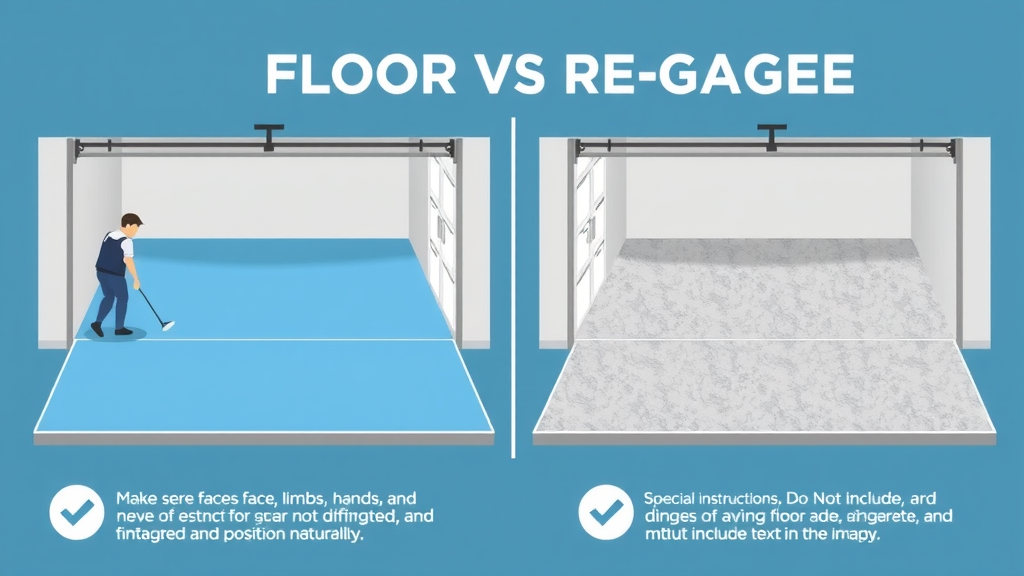
How Floor Coatings Extend Lifespan of Your Concrete Garage Floor
Applying a strong floor coating—such as an epoxy floor or advanced water-based solution—acts as a barrier between your concrete and the elements. Coatings shield against oil, salt, and brake fluid, all of which can degrade the unprotected concrete garage floor over time. They also protect from freeze-thaw cycles and heavy traffic, standard in most garages.
By enhancing the durability, resilience, and stain-resistance of your floor, these coatings can significantly extend its useful life. In fact, protective coatings like epoxy coatings are commonly used in industrial applications, so you know they provide robust defense even under the harshest conditions. Investing in the right coating means fewer repairs, enhanced safety, and a longer-lasting garage floor for years to come.
Types of Garage Floor Resurfacing and Floor Coating Solutions
Epoxy Floor Coating vs. Water Based Options
Epoxy floor coatings are among the most popular and robust solutions for garage flooring. They combine synthetic resins with a hardener that, once cured, creates a glossy, impermeable surface. Epoxy is highly resistant to abrasion, chemical spills, and tire marks, making it ideal for both residential and industrial applications. However, epoxy must be applied to a meticulously clean and dry concrete floor, which can increase preparation time.
Water-based coatings, on the other hand, are easier to work with and have a lower odor profile. These coatings generally cost less per square foot, making them suitable for homeowners on a tight budget who still desire a refreshed appearance. While not as durable as epoxy, water-based products offer faster drying times and less intensive surface prep. Whether you choose an epoxy or water-based solution, both options provide a range of decorative elements and finishes, so you can tailor your floor’s look and performance to your needs.
Polished Concrete and Other Flooring Solutions
Polished concrete is an excellent choice for those seeking a low-maintenance, modern finish in the garage. This process involves grinding down the concrete surface to a high-gloss sheen, revealing the natural beauty and texture of the floor. Polished concrete stands up well to stains and can be enhanced with dyes or decorative aggregate for added visual interest.
Other garage flooring options include self-leveling overlays, which can correct unevenness and repair damaged areas in a single step. Each flooring solution has distinct benefits: Polished concrete offers unmatched longevity and a sleek appearance, while self-leveling compounds work quickly and provide a smooth, functional finish. If you’re seeking maximum benefit, consider combining a resurfacing layer with a high-quality floor coating for the ultimate upgrade.
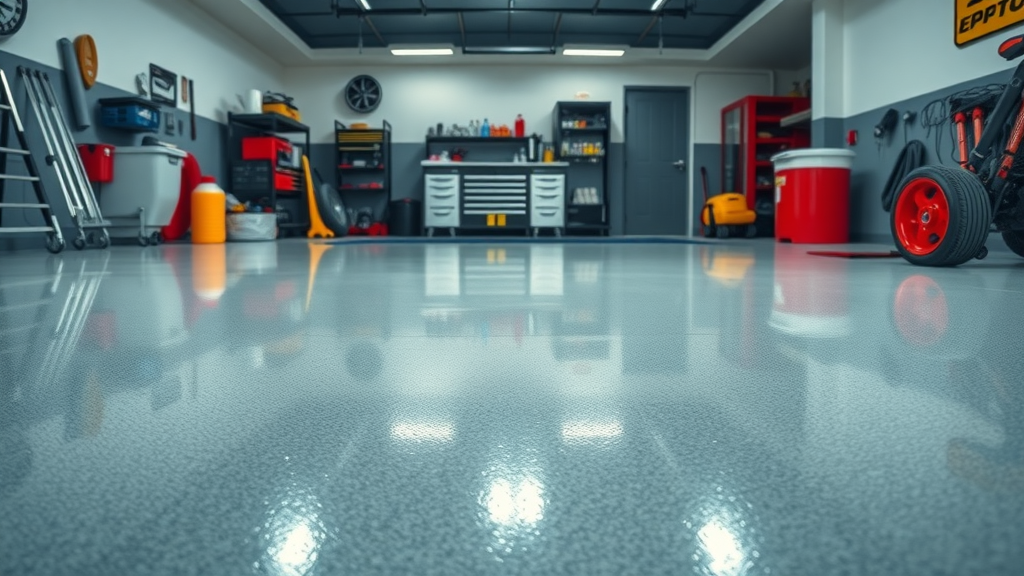
Choosing the Right Garage Floor Coating for Your Needs
Selecting the appropriate garage floor coating depends on factors like your budget, the current state of your concrete slab, and your desired level of gloss or slip resistance. Epoxy flooring is perfect for those wanting top durability and eye-catching sheen, while water-based coatings offer decent performance with less expense and complexity.
If you prioritize aesthetics and longevity, polished concrete might be your top pick; however, for repairing widespread damage, a self-leveling overlay is often recommended. Always consider your garage’s usage—will it see frequent vehicle traffic or serve as a workshop? Matching the right product to your needs ensures your new floor is both beautiful and built to last.
Concrete Surface Preparation for Effective Garage Floor Resurfacing
Assessing and Repairing Damaged Concrete Garage Floors
Every successful garage floor resurfacing project begins with a thorough inspection of the existing concrete garage floor. Look for cracks, divots, or areas where the surface has worn away. Sometimes, a basic concrete overlay might suffice, but severely damaged floors may need patching or more intensive concrete repair before resurfacing material is applied.
To improve the bond between new and old surfaces, all damage must be cleaned and filled. This often involves using specialized compounds designed for concrete repair. By addressing cracks and uneven spots at this stage, you lay the groundwork for a durable, long-lasting solution—ensuring your new garage flooring doesn’t fail prematurely due to underlying hidden flaws.
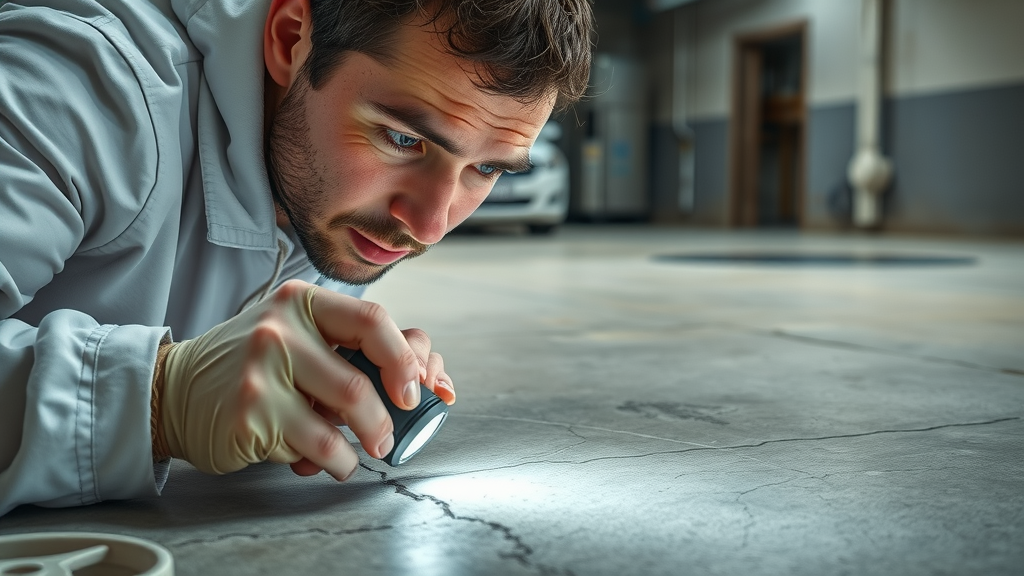
Concrete Repair and Resurfacing Material Essentials
Choosing the right resurfacing material is vital to the success of your project. Many products are designed for easy mixing and spreading, but selecting the right one depends on the extent of existing damage and your flooring goals. Self-leveling materials are best for uneven floors, while polymer-modified mixes handle minor cracks and imperfections well.
You’ll also need repair products to fill holes or deeper cracks before applying the top layer. For lasting results, opt for products compatible with your concrete garage floor and follow manufacturer guidelines to achieve proper curing and adhesion. Meticulous selection ensures that your resurfaced garage floor can withstand daily wear and the occasional mishap.
How to Prep a Concrete Garage Floor for Resurfacing
Preparation is key—no amount of resurfacing material or floor coating can compensate for a dirty or unprepared surface. Start by removing all loose debris, dirt, and existing coatings with a power washer or stiff broom. Any oils or chemicals should be eliminated with a degreasing solution, as residues can prevent bonding.
Next, repair cracks or holes with suitable fillers and let them dry. Etching the surface with a mild acid or mechanical grinder creates additional texture, giving your new overlay or coating something to “grip.” Properly prepping your garage floor can be the difference between a finish that lasts for years and one that peels or flakes after a single season.
Cost of Garage Floor Resurfacing and Budget-Friendly Solutions
Concrete Garage Floor Resurfacing: What Impacts the Cost?
The cost of garage floor resurfacing can vary widely, primarily influenced by the size of the project, the amount of concrete repair required, and the type of resurfacing material or floor coating chosen. While a simple water-based coating is budget-friendly, top-tier finishes such as polished concrete or self-leveling overlays come at a premium per sq ft.
Other price factors include surface prep, labor (if you hire professionals), and decorative options like custom colors or anti-slip additives. For most homeowners, you’ll find resurfacing costs typically range from $3 to $10 per square foot. Evaluating options on both performance and price ensures you select a flooring solution that fits your needs—and wallet.
Comparison Table: Garage Floor Coatings vs. Resurfacing
Type |
Avg. Cost per Sq Ft |
Durability |
Ease of Maintenance |
Visual Impact |
|---|---|---|---|---|
Epoxy Coating |
$3–$7 |
High |
Easy |
Glossy |
Polished Concrete |
$3–$12 |
Very High |
Moderate |
Sleek |
Water Based Coatings |
$2–$5 |
Medium |
Easy |
Matt |
Self-Leveling Overlays |
$4–$10 |
High |
Moderate |
Smooth |

The Cheapest Way to Refinish Your Garage Floor
For those on a shoestring budget, water-based floor coatings and thin concrete overlays are the most affordable avenues to a revived garage surface. Water-based options are easy to apply and deliver functional results without expensive tools or lengthy downtime, usually costing only a few dollars per square foot.
A thin overlay—typically 1/4” thick concrete resurfacing product—can mask minor flaws and restore smoothness. While not as heavy-duty as epoxy or polished concrete, these low-cost alternatives still provide a dramatic improvement over bare, damaged concrete. By focusing on fundamental steps like cleaning and crack repair, DIYers can achieve impressive results even on a modest budget.
Step-by-Step Process: DIY Garage Floor Resurfacing Guide
Inspect your concrete garage floor for cracks, stains, and uneven areas.
Clean and degrease the garage floor with a power washer and specialized cleaner to remove all contaminants.
Repair cracks and holes using the right resurfacing material, allowing full curing before continuing.
Apply primer to your concrete surface for optimal bonding.
Mix and pour your garage floor resurfacing compound, following product instructions carefully.
Level and smooth the resurfacing material with a spreader or trowel for an even finish.
Cure, seal, and finish the concrete floor according to manufacturer guidelines to lock in protection and shine.
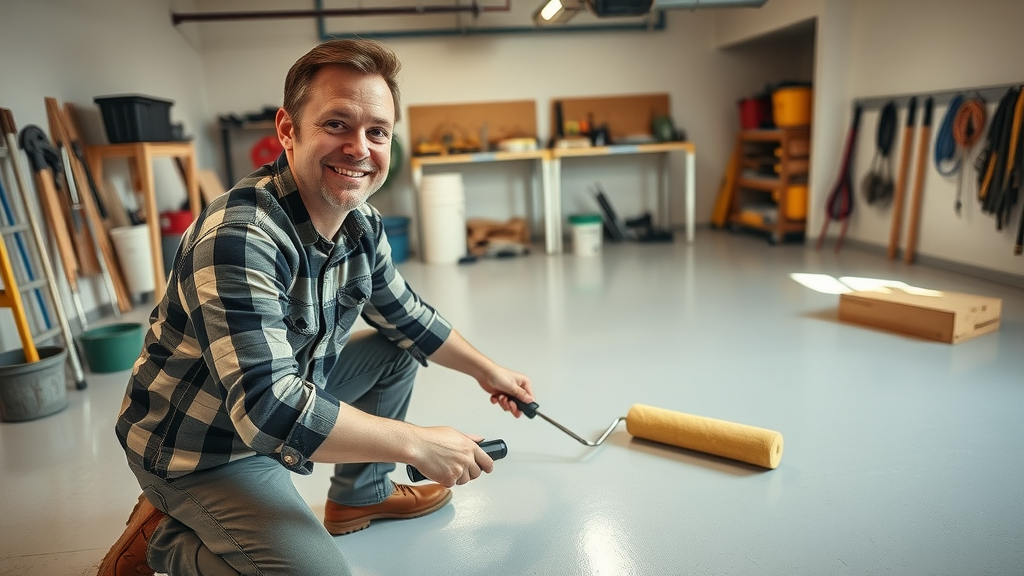
Resurfacing Material: Pro Tips for Best Results
To achieve professional results, always choose resurfacing material compatible with your climate and use case. Ensure temperatures remain within the manufacturer’s suggested range, and avoid high humidity or direct sunlight during application. Mixing thoroughly, spreading evenly, and allowing full curing time is essential for a resilient finish. For added durability, consider sealing your new surface with a clear protective topcoat.
"Most garage floors fail not because of the coating used, but because surface prep was rushed. Proper preparation is the foundation for any successful garage floor resurfacing." – Leading Flooring Specialist
Expert Tips for Long-lasting Garage Floor Coatings
How to Maintain Your Resurfaced Concrete Garage Floor
Once your resurfaced garage floor is complete, regular maintenance will preserve its integrity and gloss. Sweep or mop frequently to remove abrasive dirt and debris, which can cause scratches. For tougher stains or spills, a mild detergent and soft brush usually does the trick. Avoid harsh chemicals that might eat away at protective coatings.
If you notice chips or wear, address them promptly using repair kits designed for your specific floor coating. Annual inspections, especially before winter, help catch problems early. These steps not only maintain your floor’s visual appeal but also prolong its lifespan—delivering reliable performance year after year.
Common Mistakes to Avoid with Garage Floor Resurfacing
The biggest mistakes homeowners make involve rushing through the cleaning and surface preparation stages. Skipping crack repairs, failing to remove oil and grease, or insufficiently abrading the concrete surface can lead to poor adhesion, causing bubbles or peeling. Always factor in proper drying and curing times, and don’t be tempted to park your car or place heavy objects on the floor too soon.
Selecting the wrong type of coating for your floor’s condition or climate can also result in early failure. When in doubt, opt for solutions tailored to garage flooring, and consult with a local floor coating specialist. Taking time up front drastically improves your surface’s longevity and performance.
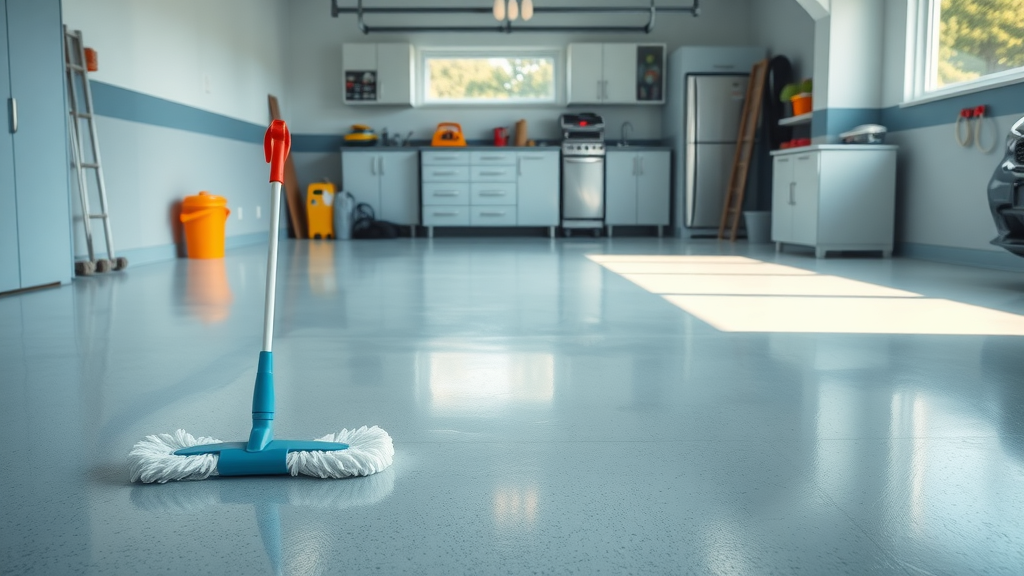
People Also Ask: Your Garage Floor Resurfacing Questions Answered
How much does it cost to resurface a garage floor?
The cost for garage floor resurfacing varies based on floor size, damage level, and type of resurfacing material, but typically ranges from $3 to $10 per square foot.
Can a concrete garage floor be resurfaced?
Yes, most concrete garage floors can be resurfaced unless severely damaged or structurally unsound. Professional concrete resurfacing products renew appearance and durability.
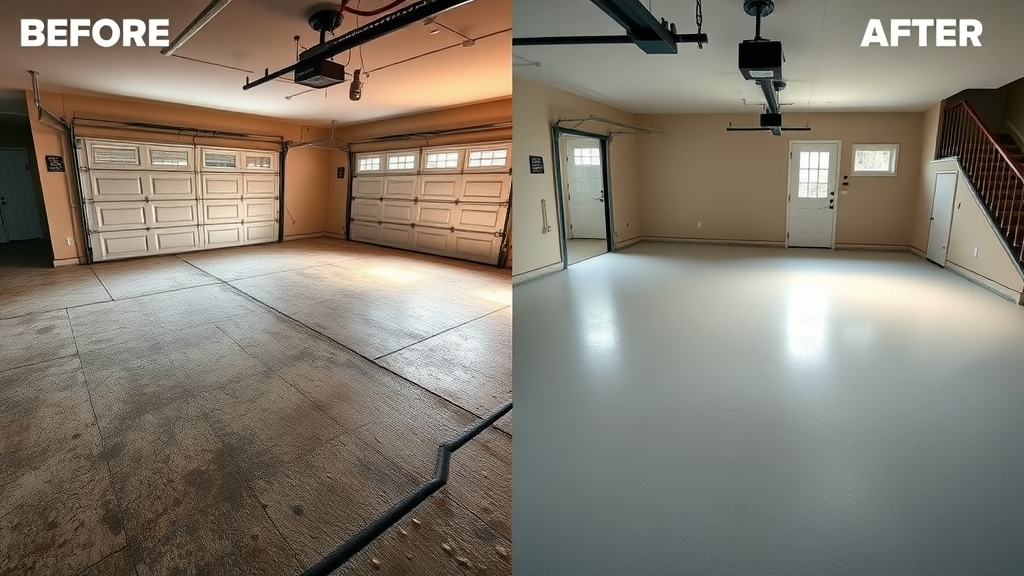
What is the cheapest way to refinish a garage floor?
The most affordable method is a water-based floor coating or a thin concrete overlay, which provide functional results with minimal investment.
Can you pour self-leveling concrete over existing concrete?
Yes, self-leveling concrete can be poured over existing concrete garage floors after proper cleaning and priming, making it a fast solution for uneven surfaces.
FAQs on Garage Floor Resurfacing
How long does garage floor resurfacing last?
— A professional resurfacing job can easily last 5–15 years or longer, depending on usage and maintenance.Can you apply floor coatings in winter?
— Many floor coatings require temperatures above 50°F to properly cure, so check your product specifics or wait for warmer conditions.Is garage floor resurfacing a DIY-friendly project?
— With proper preparation and guidance, most resurfacing jobs can be completed by handy DIYers using quality materials.Are epoxy coatings good for garage floors?
— Yes, epoxy coatings are an excellent choice for garage floors due to their extreme durability and chemical resistance.

Key Takeaways: Garage Floor Resurfacing Essentials
Garage floor resurfacing breathes new life into concrete floors
Preparation and material selection are vital for lasting results
Several floor coating and resurfacing options exist for various budgets
Professional and DIY approaches are both feasible
Conclusion: Give Your Garage Floor a New Life
Recap: Why Invest in Garage Floor Resurfacing?
Garage floor resurfacing delivers a simpler, cost-effective way to enhance your garage's durability and boost your home's value. It’s an investment that pays off with years of easy maintenance and improved safety.
Next Steps to Your Perfect Concrete Garage Floor
Ready to restore your space? Arm yourself with the right information, choose quality materials, and consider expert help if needed—your perfect concrete garage floor is within reach.
Call to Action: Get Your Free Estimate for Garage Floor Resurfacing
Call us now to get your free quote!!
Resurfacing your garage floor not only enhances its appearance but also extends its durability and functionality. For a comprehensive understanding of the various resurfacing methods, including concrete resurfacers, epoxy coatings, and polished concrete, consider reading (constructli.com). This resource provides detailed insights into each technique, helping you choose the best option for your needs. Additionally, to explore durable and practical garage flooring options suited for cars, workshops, and multipurpose spaces, you might find (homebuilding.co.uk) particularly useful. It emphasizes the importance of thorough surface preparation and discusses various finishes, including epoxy and resin coatings, polished concrete, and interlocking tiles, to help you make an informed decision. If you’re serious about revitalizing your garage floor, these resources will equip you with the knowledge to achieve a long-lasting and aesthetically pleasing result.
 Add Row
Add Row  Add
Add 

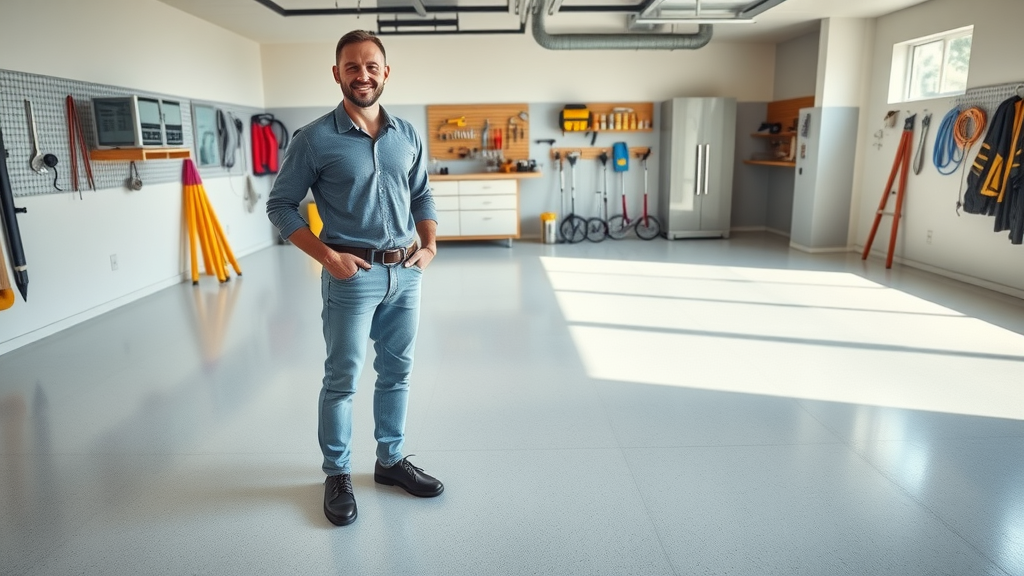
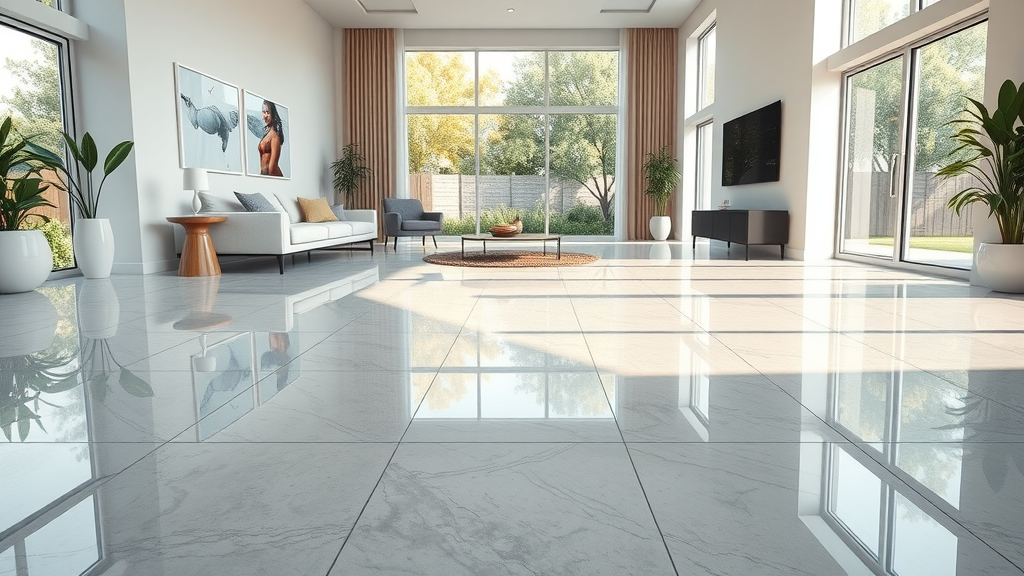
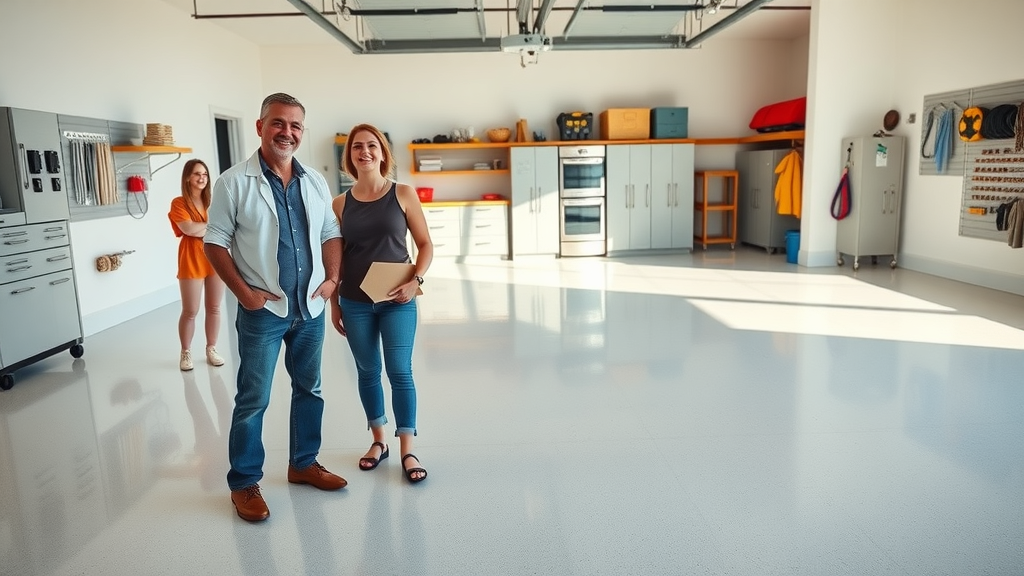
Write A Comment